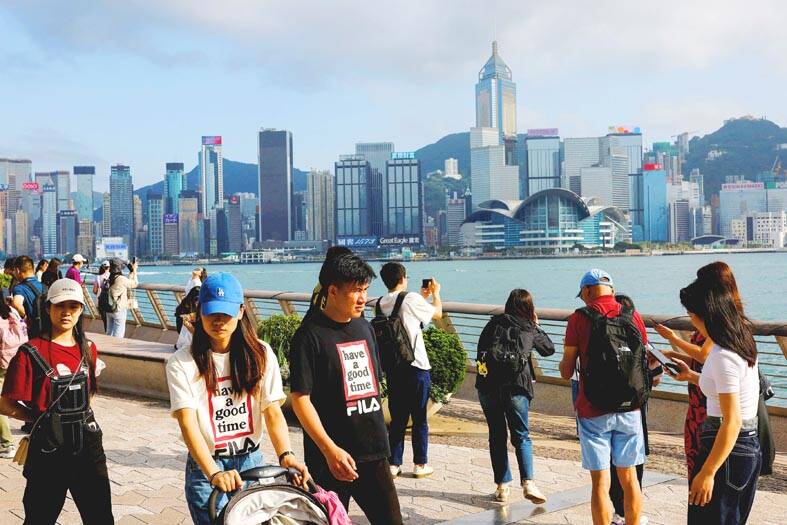Hong Kong journalists rated the territory’s press freedom lower than ever in an annual survey released yesterday, citing fears of sweeping national security laws.
Published every year since 2013 by the Hong Kong Journalists Association (HKJA) and the Hong Kong Public Opinion Research Institute, the Press Freedom Index ranks the territory’s media environment on a scale of zero to 100 — 100 being a perfect score. It is based on a poll of more than 250 working journalists and about 1,000 members of the public.
The rating this year among journalists dropped to a record low of 25, down 0.7 points from last year and 17 points from the survey’s launch.

Photo: Reuters
More than 90 percent of the surveyed journalists said that Hong Kong’s press freedom was “significantly” impacted by a new security law enacted in March, which punishes crimes such as espionage and foreign interference.
Colloquially known as Article 23, it was the second such law enacted for the financial hub, following one imposed by Beijing in 2020 after Hong Kong saw massive, and at times violent, pro-democracy protests.
Ninety-four percent of journalists also cited the prosecution of media tycoon Jimmy Lai (黎智英), founder of Hong Kong’s now-shuttered Chinese-language tabloid Apple Daily, under the first law as being “highly damaging” to press freedom.
Other concerns included the disappearance of South China Morning Post reporter Minnie Chan (陳敏莉) in Beijing.
HKJA had previously released a statement saying it was “very concerned” about Chan, an award-winning journalist, who has been unreachable since attending a security forum in Beijing last year.
For the public, the overall rating was 42.2 — largely stable after the last major drop from 45 in 2018 to 41.9 in 2019.
“This discrepancy may be explained by the relatively less heated discussion around Article 23 compared to the 2020 National Security Law,” HKJA said in a statement.
However, journalists are “more cognizant of potentially running afoul of the new crimes created by Article 23 when reporting,” it said.
The Chinese Ministry of Foreign Affairs said that Hong Kong’s security laws “target a very small number of individuals who severely endanger national security, not law-abiding media reporters.”
Since the laws’ implementation, “press freedom in Hong Kong has been better protected under a safe and stable environment in accordance with the law,” ministry spokeswoman Mao Ning (毛寧) told a regular news briefing.
The index’s publication came weeks after HKJA’s newly elected chairperson, Selina Cheng (鄭嘉如), was fired by the Wall Street Journal after she took up the new role.
The Journal’s parent company, Dow Jones, declined to comment on Cheng’s case, but said at the time that it “continues to be a fierce and vocal advocate for press freedom.”

ENDEAVOR MANTA: The ship is programmed to automatically return to its designated home port and would self-destruct if seized by another party The Endeavor Manta, Taiwan’s first military-specification uncrewed surface vehicle (USV) tailor-made to operate in the Taiwan Strait in a bid to bolster the nation’s asymmetric combat capabilities made its first appearance at Kaohsiung’s Singda Harbor yesterday. Taking inspiration from Ukraine’s navy, which is using USVs to force Russia’s Black Sea fleet to take shelter within its own ports, CSBC Taiwan (台灣國際造船) established a research and development unit on USVs last year, CSBC chairman Huang Cheng-hung (黃正弘) said. With the exception of the satellite guidance system and the outboard motors — which were purchased from foreign companies that were not affiliated with Chinese-funded

PERMIT REVOKED: The influencer at a news conference said the National Immigration Agency was infringing on human rights and persecuting Chinese spouses Chinese influencer “Yaya in Taiwan” (亞亞在台灣) yesterday evening voluntarily left Taiwan, despite saying yesterday morning that she had “no intention” of leaving after her residence permit was revoked over her comments on Taiwan being “unified” with China by military force. The Ministry of the Interior yesterday had said that it could forcibly deport the influencer at midnight, but was considering taking a more flexible approach and beginning procedures this morning. The influencer, whose given name is Liu Zhenya (劉振亞), departed on a 8:45pm flight from Taipei International Airport (Songshan airport) to Fuzhou, China. Liu held a news conference at the airport at 7pm,

Authorities yesterday elaborated on the rules governing Employment Gold Cards after a US cardholder was barred from entering Taiwan for six years after working without a permit during a 2023 visit. American YouTuber LeLe Farley was barred after already being approved for an Employment Gold Card, he said in a video published on his channel on Saturday. Farley, who has more than 420,000 subscribers on his YouTube channel, was approved for his Gold Card last month, but was told at a check-in counter at the Los Angeles International Airport that he could not enter Taiwan. That was because he previously participated in two

SECURITY RISK: If there is a conflict between China and Taiwan, ‘there would likely be significant consequences to global economic and security interests,’ it said China remains the top military and cyber threat to the US and continues to make progress on capabilities to seize Taiwan, a report by US intelligence agencies said on Tuesday. The report provides an overview of the “collective insights” of top US intelligence agencies about the security threats to the US posed by foreign nations and criminal organizations. In its Annual Threat Assessment, the agencies divided threats facing the US into two broad categories, “nonstate transnational criminals and terrorists” and “major state actors,” with China, Russia, Iran and North Korea named. Of those countries, “China presents the most comprehensive and robust military threat